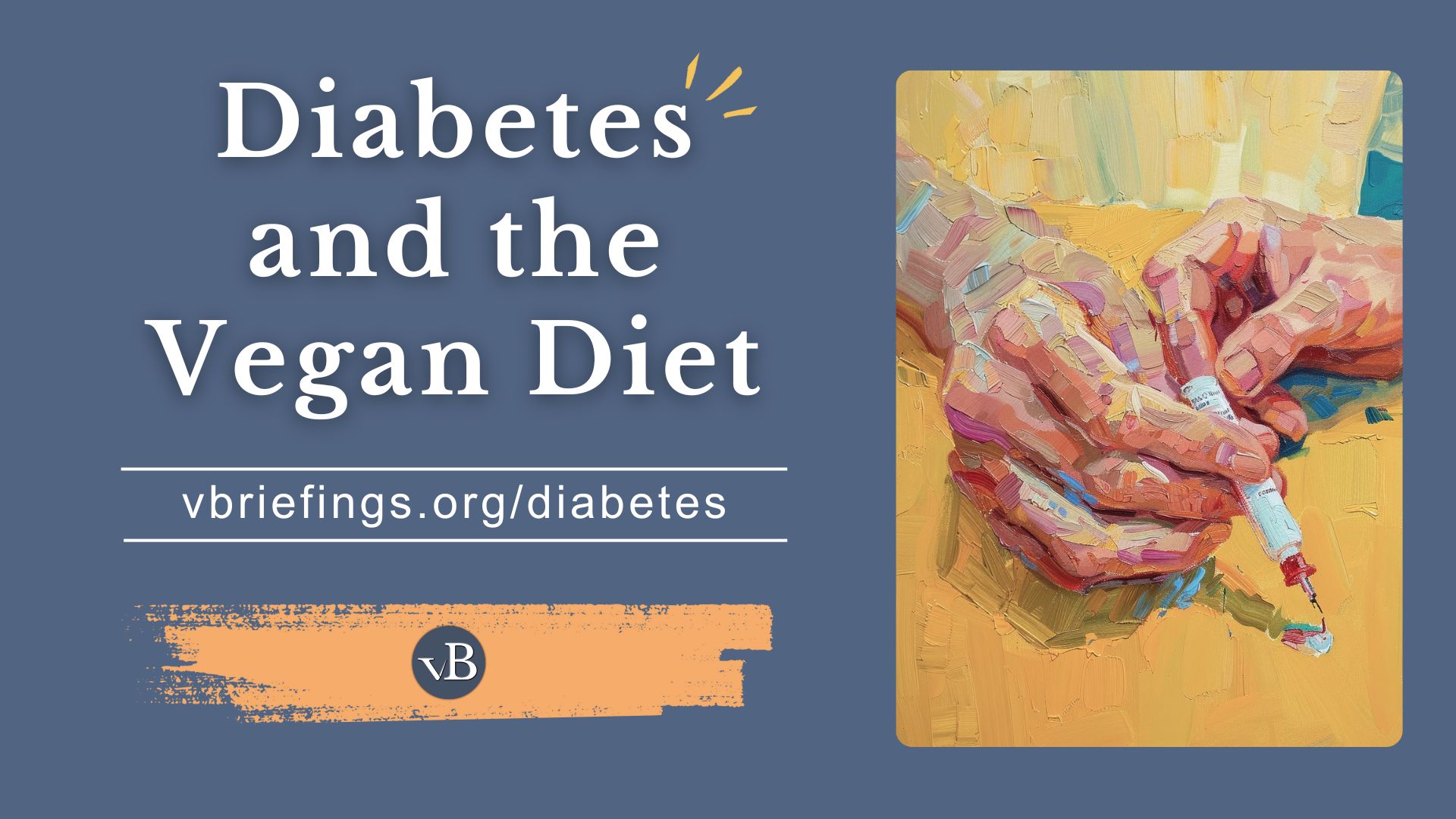Preface
Briefing description and more.
For some individuals, a vegan diet can mitigate and possibly eliminate diabetes.
Companion Videos
How to use companion videos
Videos may be posted on multiple social media platforms, and you can share them on each platform according each platform’s conventions.
Share this Briefing
Social Media Sharing Image
This image will be used when sharing the briefing on a social media platform. You can see all social sharing images in the grid view.

How to share this briefing
Click on the icon for the platform on which you wish to share. What happens next depends on the platform, but generally a popup will appear, letting you add your own text as you share.
Briefing Meta
Metrics
Note: we will publish additional briefings after completing flashcards and presentation slides for selected briefings.
Counts:
| Main Text | |
| Key Points | 6 |
| Counterclaims | 1 |
| Supplementary | 4 |
| Further Study | 3 |
| Footnotes | 19 |
| Media & Advocacy | |
| Advocacy Notes | 5 |
| —Socratic Questions | 6 |
| Flashcards | 23 |
| Presentation Slides | 0 |
| Memes & Infographics | 0 |
| Companion Videos | 0 |
Other Meta:
Date Posted:
Last Edited:
Edit Log:
Key Points Links
Loading…
Help Us Improve
Please send your suggestions for improvements, or report any issues with this briefing to team@vbriefings.org
We appreciate that you are taking the time to help up improve. All suggestions and reports will be carefully considered.
Summary
A concise summary of the briefing (see below for citations).
A vegan diet is widely supported as beneficial for diabetes by leading health organizations, with research showing that the prevalence of type 2 diabetes among vegans is less than half that of non-vegans. Plant-based diets may also be more effective than medications in improving symptoms of type 2 diabetes, with some individuals reducing or eliminating their medications. A vegan diet may even be more effective for diabetes than the diet recommended by the American Diabetes Association.
Context
Places this topic in its larger context.
While a vegan diet can mitigate and possibly eliminate diabetes for some, we are not suggesting that it’s the only diet that can do so.
This topic is not directly related to animal rights and veganism, but it seems likely that people who are concerned about diabetes and know the potential benefits of a vegan diet for diabetes will be less inclined to dismiss veganism.
Key Points
This section provides talking points.
Prominent experts agree that a vegan diet is beneficial for diabetes.
The Academy of Nutrition and Dietetics says in an official position statement: “Vegetarians and vegans are at reduced risk of certain health conditions, including ischemic heart disease, type 2 diabetes, hypertension, certain types of cancer, and obesity.1
Harvard Health says: “Research suggests that a predominantly plant-based diet can reduce the risk for type 2 diabetes.”2
Mayo Clinic says: “Reasons for following a vegetarian diet [explicitly defined to include, among other diets, a vegan diet] are varied but include health benefits, such as reducing your risk of heart disease, diabetes and some cancers.”3
Cleveland Clinic says: “There really are no disadvantages to a herbivorous diet! A plant-based diet has many health benefits, including lowering the risk for heart disease, hypertension, Type 2 diabetes, and cancer. It can also help lower cholesterol and blood pressure levels, plus maintain weight and bone health.”4
Kaiser Permanente says: “Physicians should consider recommending a plant-based diet to all their patients, especially those with high blood pressure, diabetes, cardiovascular disease, or obesity.”5
The Dietitians of Canada say: “A healthy vegan diet has many health benefits including lower rates of obesity, heart disease, high blood pressure, high blood cholesterol, type 2 diabetes and certain types of cancer.”6
New York Presbyterian Healthcare says that “plant-based diets are believed to be an effective means of treating chronic disease, including diabetes.”7
Vegans may have half the prevalence of diabetes than non-vegans.
A study published by the American Diabetes Association found that the prevalence of type 2 diabetes in vegans was less than half that of those who consumed meat, dairy, and eggs, and was also less compared to various other varieties of vegetarian diets (the study followed more than 60,000 people).8
Vegan and vegetarian diets may be more effective than medications in improving diabetes symptoms.
A vegan diet may be more effective for diabetes than the diet recommended by the American Diabetes Association.
A study published in Diabetes Care Journal found that a vegan diet was more effective at improving type 2 diabetes than the American Diabetes Association’s own diet.14
Those adopting a vegan diet may be able to lower or eliminate their diabetes medications.
According to a review published in Current Diabetes Reports in 2018, several studies have found that medication use significantly decreased or was able to be discontinued when participants “adopted any type of vegetarian or vegan diet.”15
Studies indicate that plant-based diets might possibly help with type 1 diabetes, not just type 2.
A randomized clinical trial comprised of individuals with type 1 diabetes compared the effects of a low-fat vegan diet versus a portion-controlled diet over 12 weeks. The findings, published in ADA’s Clinical Diabetes in 2024, suggest that a low-fat vegan diet may be beneficial for improving glycemic control, reducing insulin requirements, and promoting cardiovascular and renal health in individuals.16
“Plant-based diets rich in whole carbohydrates can improve insulin sensitivity and other health markers in individuals with type 1 diabetes, according to two case studies published by researchers from the Physicians Committee for Responsible Medicine in the Journal of Diabetes and Metabolism.”17
Counterclaims
Responses to some yes but retorts.
Claim: Vegan diets are not the only dietary pattern that can mitigate diabetes.
This is true,18 but if diabetes can be mitigated by a dietary pattern that is healthy overall, the most ethically sound, and is better for the environment, why wouldn’t you make that choice?
Supplementary Info
Additional information that may prove useful.
Statistics from the American Diabetes Association:19
- Prevalence. In the United States, 11.6% of the population, or 38.4 million people, had diabetes in 2021. 1 in 5 people with diabetes don’t know they have it.
- Type. Type 2 diabetes accounts for around 95% of diagnosed cases, while type 1 diabetes accounts for around 5%.
- New Cases. Each year, 1.2 million people in the United States receive a diabetes diagnosis.
- Cost. The average medical costs for individuals with diagnosed diabetes are 2.6 times greater than they would be without the condition.
Further Study
Sources providing a deeper understanding of the topic or related topics.
Other Resources
Article: Diabetes and Diet: Here’s What You Need to Know (Forks Over Knives)
Article: Vegan Diet and Diabetes: Everything You Need to Know (Diabetes Strong)
Advocacy Resources
Information to help with outreach and advocacy.
Note: we will publish additional briefings after completing flashcards and presentation slides for selected briefings.
Share This Briefing
Cloned from the Preface Section on page load.
Companion Videos
Cloned from the Preface Section on page load.
Memes and Infographics
No images found.
How to use Memes and Infographics
To sequence through all memes and infographics on this page, click on any image than use the arrow keys or the arrow buttons to show next and previous images.
To share a meme or infographic, right click on the image and choose download or save as. Then upload the image to the platform of choice.
Presentation Slides
Slides not available.
How to Use the Presentation Slides
You can view the slideshow full screen by clicking on the first link above.
To use Canva presenter mode, view the speaker notes, or download the slides as PowerPoint, login to Canva (the free account works) and follow the Full Canva Link provided above.
To copy this presentation to your own Canva project, use the Full Canva Link provided above, then select File->Make a Copy from the upper left. You can build your own unique presentation from multiple briefings by copying the presentation from each briefing and then building another presentation from the copied presentations.
Flash Cards
We partner with Brainscape because of their excellent features for learning. You will need to create a free Brainscape account to study the cards.
Go to Flash Cards: This will take you to a list of decks.
About Flash Cards and Brainscape
Flash cards are here to help you commit important facts and concepts in this briefing to memory.
In Brainscape, there is one deck for each briefing. You can study more than one deck at a time. Brainscape uses spaced repetition to promote memory retention. It is “the secret to learning more while studying less.”
You can study using your browser, but Brainscape also has a free mobile app that makes learning anywhere easy.
Socratic Questions
Socratic-style questions are embedded in the Advocacy Notes below, and shown in italics.
These are open-ended, thought-provoking questions designed to encourage critical thinking, self-reflection, and deeper understanding. They are inspired by the Socratic method, a teaching technique attributed to the ancient Greek philosopher Socrates, who would ask his students probing questions rather than directly providing answers.
The goal is to help people examine their beliefs, clarify their thoughts, uncover assumptions, and explore the evidence and reasoning behind their ideas.
Advocacy Notes
Tips for Advocacy and Outreach
General Tips
As noted in the Context Section, it seems likely that people who are concerned about diabetes and know the potential benefits of a vegan diet for diabetes will be less inclined to dismiss veganism.
During a general conversation on veganism, this topic is not likely to come up, but if it does you should determine whether on not your interlocutor has a personal connection to the disease. If so, spend more time covering the key points in this briefing before segueing to animal ethics; if not, try to bring the conversation back to the animals and ethics.
Some people believe that vegan diets are too high in carbohydrates and therefore bad for diabetes, while others accept that plant-based diets might help but argue they are just one of many options. Your goal is to challenge these assumptions using only verified facts and show that a well-planned vegan diet is not only effective for diabetes but also the most ethical and environmentally sustainable choice.
Segue the Conversation Back to Animal Ethics
People often acknowledge the health benefits of a vegan diet for managing or mitigating diabetes, but this can sometimes shift the focus away from the core ethical reasons for veganism. Instead of solely focusing on personal health, redirect the conversation back to animal ethics.
- “Even if a vegan diet had no health benefits, would that justify harming and killing animals when we don’t have to?”
- “If we know that a vegan diet can help prevent and even reverse diabetes, doesn’t that mean we have even less justification for eating animals?”
- “Sure, other diets may help with diabetes, but do they also reduce animal suffering and lower environmental damage? A plant-based diet does all three.”
Why? This keeps the focus on ethics instead of letting them use this argument as a distraction.
Use Trust in Respected Health Organizations
Many people trust credentialed professionals and major health organizations over activists. Use this.
- “The Academy of Nutrition and Dietetics, Harvard Health, the Mayo Clinic, and the Cleveland Clinic all recognize plant-based diets as beneficial for diabetes. Would they recommend something that wasn’t effective?”
- “If plant-based diets weren’t beneficial, why do major health organizations, including the American Diabetes Association, recognize them as effective for diabetes management and other health issues?”
- “Kaiser Permanente advises doctors to recommend plant-based diets, including for patients with diabetes. If plant-based eating didn’t work, why would they say that?”
Why? This shifts the conversation away from personal opinions and toward expert consensus.
Footnotes
Our sources, with links back to where they are used.
- Melina, Vesanto, Winston Craig, and Susan Levin. “Position of the Academy of Nutrition and Dietetics: Vegetarian Diets.” Journal of the Academy of Nutrition and Dietetics 116, no. 12 (December 2016): 1970–80. https://doi.org/10.1016/j.jand.2016.09.025. ↩︎
- “Becoming a Vegetarian.” Harvard Health Publishing, Harvard Medical School. April 15, 2020.
↩︎ - Vegetarian Diet: How to Get the Best Nutrition.” Mayo Clinic. March 14, 2016. ↩︎
- Understanding Vegetarianism & Heart Health” Cleveland Clinic, December 2013. ↩︎
- Phillip J Tuso, MD, Mohamed H Ismail, MD, Benjamin P Ha, MD, and Carole Bartolotto, MD, RD. “Nutritional Update for Physicians: Plant-Based Diets.” The Permanente Journal – The Permanente Press – Kaiser Permanente – Permanente Medical Groups, 2013. ↩︎
- Healthy Eating Guidelines for Vegans.” Dietitians of Canada, November 2017. ↩︎
- Ask A Nutritionist: Plant-Based Diets.” NewYork-Presbyterian, March 30, 2017. ↩︎
- Tonstad S, Butler T, Yan R, Fraser GE. Type of vegetarian diet, body weight, and prevalence of type 2 diabetes. Diabetes Care. 2009; 32(5):791–796. ↩︎
- Olfert MD, Wattick RA. Vegetarian Diets and the Risk of Diabetes. Curr Diab Rep. 2018 Sep 18;18(11):101. ↩︎
- Anderson JW, Ward K. High-carbohydrate, high-fiber diets for insulin-treated men with diabetes mellitus. Am J Clin Nutr. 1979;32(11):2312–2 ↩︎
- Barnard RJ, Jung T, Inkeles SB. Diet and exercise in the treatment of NIDDM. The need for early emphasis. Diabetes Care. 1994;17:1469–1472. ↩︎
- Barnard ND, Cohen J, Jenkins DJ, et al. A low-fat vegan diet improves glycemic control and cardiovascular risk factors in a randomized clinical trial in individuals with type 2 diabetes. Diabetes Care. 2006;29(8):1777–1783. ↩︎
- Tonstad S, Butler T, Yan R, Fraser GE. Type of vegetarian diet, body weight, and prevalence of type 2 diabetes. Diabetes Care. 2009;32(5):791–796. ↩︎
- Neal D. Barnard, MD, et al. “A low-fat vegan diet improves glycemic control and cardiovascular risk factors in a randomized clinical trial in individuals with type 2 diabetes.” Diabetes Care Journal, August 2006 ↩︎
- Olfert MD, Wattick RA. Vegetarian Diets and the Risk of Diabetes. Curr Diab Rep. 2018 Sep 18;18(11):101. ↩︎
- Hana Kahleova, Tatiana Znayenko-Miller, Karen Smith, Cyrus Khambatta, Robby Barbaro, Macy Sutton, Danielle N. Holtz, Mark Sklar, Desiree Pineda, Richard Holubkov, Neal D. Barnard; Effect of a Dietary Intervention on Insulin Requirements and Glycemic Control in Type 1 Diabetes: A 12-Week Randomized Clinical Trial. Clin Diabetes 2024; cd230086. ↩︎
- “Plant-Based Diets High in Carbs Improve Type 1 Diabetes, According to New Case Studies.” Physicians Committee. July 23, 2020 ↩︎
- Khazrai, Y. M., et al. “Effect of Diet on Type 2 Diabetes Mellitus: A Review.” Diabetes/Metabolism Research and Reviews, vol. 30, no. S1, 14 Feb. 2017, pp. 24–33. Accessed 12 Jan. 2025. ↩︎
- American Diabetes Association. “Statistics about Diabetes.” Diabetes.org, American Diabetes Association, 2 Nov. 2023. Accessed 12 Jan. 2025. ↩︎




